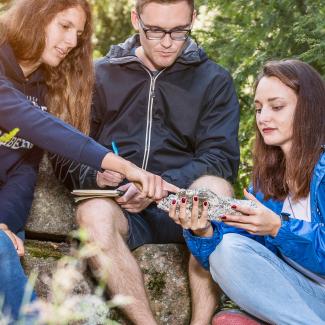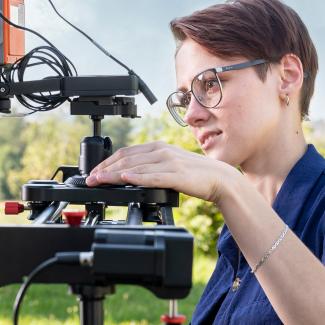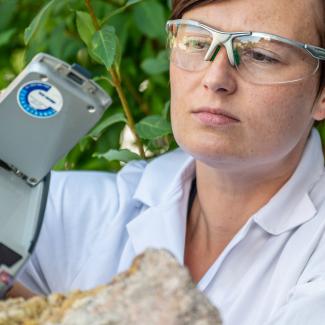Geoinformatik
Geoinformatics is the science of systematically recording, analysing and presenting location-based information in order to extract knowledge from it. The focus here is on information in the form of geological and geophysical data. Three-dimensional digital models of geological bodies are constructed as a prerequisite for the application of simulations or statistical methods. Suitable data models, database schemes and software are developed for this purpose. The methods are used in areas such as deposit exploration and mine planning, environmental monitoring and disaster protection as well as in the exploration of renewable energies.
Please note that this is a German-language degree program. At TUBAF we offer a variety of English Master's degree programs. Click here for an overview.
- Faculty
-
Faculty of Geosciences, Geoengineering and Mining (Faculty 3)
- Degree
-
Master of Science (M. Sc.)
- Standard period of study
-
4 Semester
- Part-time possible
-
Yes
- Start of studies
-
Winter semesterSummer semester
- Admission requirement
-
Bachelor's degree in Geoinformatics/Geophysics from TU Bergakademie Freiberg or at least an equivalent professionally qualifying university degree with at least 6 semesters
Language requirement
- Application: with at least B1 level German
- Admission to the degree program: with C1 level German (e.g. DSH-2)
- language courses and DSH examination at TUBAF
- Course language
-
German
in the exploration and utilisation of renewable energies: e.g. determining the geothermal potential of a subsurface, assisting in the planning of dams and hydroelectric power plants or carrying out safety checks on such structures
in the geotechnical engineering industry: e.g. for preliminary archaeological investigations or to find stable locations for large-scale structures
in institutions or geotechnical engineering companies:. e.g. for subsoil investigations, archaeological preliminary investigations or to find stable locations for large structures
in institutions or geotechnical companies: that are active in environmental monitoring and disaster protection, e.g. in checking the stability of dams and hydroelectric power plants. e.g. in checking the stability of dams and dykes under load and vibration
in raw material exploration: e.g. investigating possible oil deposits using geophysical methods or detecting oil traps using underground simulations
in software development: as well as in the sale and support of software products
in research institutions: e.g. in basic research at universities and teaching students
The geoinformatics degree programme taught me how geoinformation systems are used in everyday life and, in particular, in the geospatial industry. The field of application is vast and ranges from spatial and transport planning to environmental protection, raw material exploration and mining. In the course of the ongoing development of geoinformation systems and increasing networking, I also learnt about software development and information technology.
Evelyn Bennewitz - geoinformatics specialist, research in the field of geotechnics and mining at the TU Bergakademie Freiberg



